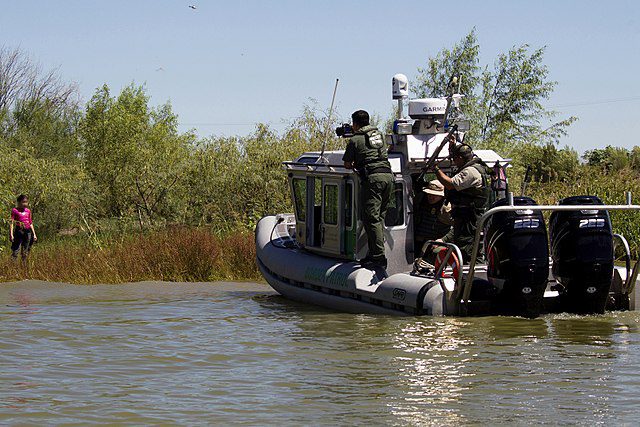
I have been accused by left-of-center polemicists of being cruel and callous concerning human life. Sorry; I don’t take to such things kindly. I had written:
Of course, the latest liberal / RINO uproar has to do with the sad photograph of a man and his child, who drowned while trying to illegally cross the border by swimming the river. I’ll leave aside the question of parental negligence: to even attempt such a thing without proper life jackets, etc. Any compassionate human being is saddened by the tragedy.
Was this parental negligence? Yes, it was! It’s negligent to even allow a child to play in two or three feet of water in a backyard pool without supervision. The manufacturers of pool rings always make it very clear that they are not “flotation devices” and can’t be trusted to function in that way. Obviously there have been tragic accidents and they are rightly and responsibly worried about liability.
The deceased 25-year-old man from El Salvador, Óscar Alberto Martínez Ramírez, was warned by others not to try to swim the river. He apparently went across without a life-jacket or even any sensible flotation aid (seaworthy or not). But if I dare to suggest that this might be construed as parental negligence, I am a worthless shred of human debris; indeed a “a lying piece of garbage”: as one commenter put it.
Let’s learn more about the actual facts of the matter, shall we? It’s far worse than I assumed it was. The following information is from the article, “Migrant Father Was Warned About Crossing Rio Grande Before Drowning With His Daughter” (Jason Hopkins, Daily Caller, 6-27-19):
The Salvadoran family that drowned in the Rio Grande was warned about the dangers of crossing the river before they drowned, a Central American migrant revealed.
“I noticed they were really nervous, scared,” Xiomara Mejia, a Honduran migrant, said to the Associated Press about the Salvadoran family she met at Matamoros, a Mexican town that directly borders Brownsville, Texas. “They had panic on their faces.” . . .
“They said to me, ‘You haven’t tried to cross the river?’” Mejia told the AP. “We said to them, ‘No,’ because of the children more than anything. I don’t know how to swim and my kids do, but either way I’m not going to risk it.”
Unfortunately for the family, they ignored the warning.
. . . The 25-year-old father first swam with his daughter across the river into Brownsville. However, when he went back for his wife, the young girl leaped into the river after her dad. Martínez swam back to grab her, but both ended up getting caught in the river’s currents. . . .
That is negligent, to carry along a 23-month-old girl. It’s precisely because we care about life and children that we have to point out these sad realities. If he had listened to Xiomara Mejia (or had heeded my advice, had I been there), the girl would be alive, and so would he. And that is compassion and love.
According to an article at The Cut (6-26-19):
Martínez, his wife Tania Vanessa Ávalos, and their little girl . . . tried to apply for asylum at the international bridge in Matamoros, Mexico, but found offices closed and many ahead of them in line. So they decided to cross the Rio Grande.
An article in The New York Times adds further relevant detail:
It remains unclear how the Martínez family intended to argue their case for asylum, or whether they even understood the legal basis for gaining such protection. Mr. Martínez’s wife, Ms. Ávalos, did not respond to requests for an interview.
But Ms. Ramírez [Óscar Alberto Martínez Ramírez’ mother] repeatedly said that her son and his family were not fleeing persecution or the threat of it — requirements for gaining asylum in the United States.
They migrated “only because of the economic situation,” she said. “Lamentably, the salaries here are very little and they aren’t enough,” she added, speaking softly. . . .
Residents and officials here say a gang dominates the neighborhood, Altavista. But Ms. Ramírez and another relative said the immediate family had not been directly imperiled by the gang. . . .
Mr. Martínez and Ms. Ávalos, however, worked relatively close to their home, family members said — she in a Chinese fast-food restaurant at a middle-class mall, and he at various branches of the pizza chain Papa John’s.
But the couple, even though they were sharing household expenses with Ms. Ramírez and her partner, were having a hard time on their salaries of about $300 a month. Last fall, they started talking about migrating to the United States.
A two-year-old girl is helpless. She was carried across a dangerous river. Her father left her alone (far as we know) on the other bank. Then he swam back and this precious girl jumped in the water, bringing about their eventual drowning. I’m writing about it in order to bring moral clarity: that it’s not Trump who is to blame or wicked conservatives who are supposedly terrible examples of Christians and don’t know the least thing about the Bible or the faith.
There is personal, parental responsibility in play here. A man chose to carry a 23-month old daughter across a wild river; then left her on the shore alone. But that’s not negligent? A young man and his very young daughter are dead. A 21-year-old woman is now a widow and has lost her precious child, and a mother now also has a dead son and granddaughter: which also likely wouldn’t have happened if we had a sane border policy and actually enforced it.
If people knew for sure that they couldn’t illegally gain access, they wouldn’t risk their lives (desperate or not) and those of their children to try. So that aspect of it is on us, and our stupid (or good but unenforced or unfunded) border policies that Republicans are desperately trying to reform, with relentless opposition from the Democrats.
I believe that the Catholic solution (as I have written about for nine years) is to stop the illegal immigration now and then thoroughly reform the asylum system, so that many millions can enter legally, through the proper procedures (just like they did at Ellis Island in New York City, in view of the Statue of Liberty; and they did reject a portion of sick would-be migrants).
Those with this position (broadly speaking, a “conservative” one) do not oppose or ignore or disdain those seeking a better life and seeking to escape from hellholes like El Salvador (whose President just apologized for this sad drowning). We are for the rule of law and a sane, compassionate, rational, sensible border policy and for legal immigration. Both/and. 69% of Republicans also favor letting the DACA / Dreamers stay, as I just noted in my other article. This includes myself.
It’s time for the usual hateful rhetoric from the left and the Democrats to stop. It’s time for solutions. We can work together on this and be the humane society we have always been (albeit with glaring blind spots like slavery and abortion and the genocide of Native Americans). The madness and the death and destruction of lives (including the exploitation of sex and drugs that is going on, by those who are using migrants) have gone on long enough.
***
Debate with Fr. Angel Sotelo
Fr. Angel Sotelo: Dave, indefensible and unconscionable acts [my original description that I later decided was too strong] come from a rational state of mind.
That people have crossed the Rio Grande, with their children and have made it to the other side means that there are odds in one’s favor. So, there is some defensible hope, that they can do it.
More to the point, when the human heart is desperate and without hope, a man should not be impeached with culpability, with the assumption that he was in a rational state of mind.
[You] and I agree on Catholic moral teaching. Where we disagree, is on the subjective culpability of the individual, based on the unique circumstances and intentions.
Desperation does lessen culpability, no doubt. I think this is borderline. I think of women who have terrible post-partum depression and drown their children in a bathtub. So were they temporarily insane? I suppose so. In any event, they’re not thought very well of.
We could also say about the migrant, that the mother and the other would-be migrants who warned him not to do it, were also probably coming from terrible conditions, but they had wits enough to know not to jump into a wild river with a 2 year-old. So that argument only goes so far.
In any event, I am not a cruel, inhumane person. My view is identical with that of the others who warned him not to do it with a child.
It’s the personal vitriol that is objectionable. We can discuss these things (just as we are doing now) without put-downs and attribution of bad faith and bad intent. I’m glad that here we actually entertain different opinions. We’re not a bunch of groupthink clones. I certainly don’t wanna surround myself with a rah-rahing fan club that never disagrees with anything I say. That’s dangerous.
I used the specific term “negligence” which might be thought to tie into “negligent homicide / involuntary manslaughter.” People still pay penalties for those. It’s not like the temporary insanity defense.
Nobody “knows” for a fact, unless they are fortune tellers with an accurate crystal ball. People have been told to flee before a hurricane, only to leave and die on the highways, or lose contact with family.
Others stayed at home, and were told they would die, only to find that the storm moved direction and they survived without any serious problems. And at the Rio Grande, millions have crossed over the last 100 years and made it to the U.S.
No matter who is giving advice, there is the possibility of coming through risky behavior safe and sound, and there is the possibility of death. It is easy for us to quarterback on Monday.
Other examples of desperation that we have defended because of the desperation of parents:
Fleeing Cuba on homemade rafts to reach the U.S.
Crossing the Berlin Wall and walking through minefields to reach W. Berlin.
Escaping after the fall of Saigon out to sea on boats through waters patrolled by the Viet Cong.
Escaping N. Korea into machine gun fire, in the hopes of reaching freedom.
And in all the above cases, Americans have praised and admired such defectors, knowing that U.S. law allowed such people immediate legal residency since they were fleeing communism.
What makes those fleeing across the Rio Grande or the scorching desert at the border to be judged with less admiration is that they are not fleeing communism and they are unwanted.
But I don’t think their desperation is “indefensible and unconscionable” because we understand less, what it is that they are fleeing from.
Obviously the couple disagreed. The wife consented to go with her husband, and consented to take their daughter.
Besides the neighbors and friends of the couple who speak of the desperation to find work, and of having to be supported by the wife’s family, there is the situation of their arrival at the border.
After having traveled 1,500 miles from El Salvador to the border, there was also confusion. What to do? Go back? They were within a mile of crossing into the U.S. With what money would they go back?
The entry point on the U.S. side that was supposed to take them in, refused to do so.
I don’t see the questions confronting them, and the decisions to be made, so easy at that point of “just about there, but not yet.”
This is why even the mom went into the Rio Grande, after allowing her husband to take the little girl. The mom was able to turn back when the current couldn’t be fought. The man wasn’t able to.
You might be right, and I might be wrong, but I don’t think either of us can say we have been in their exact same situation–and that the correct answer was clear as crystal.
Everyone defending this keeps talking about the father. No one seems to want to consider the right of the innocent, helpless daughter to life, and the responsibility that parents have to protect their children.
*
It was precisely the futility of being supported by relatives who don’t have the money to feed more mouths. It is the prospect of not being able to buy his little girl the food, clothing, and opportunities he wanted her to have, which took him to desperation.
Living far away from El Salvador, and the plight of people there, it is easy to calmly come to conclusions. But the mom and dad would not have made that trip and braved their dangers, except for love of their little girl and the desire to give her a better life.
And with that in mind, both mom and dad set across the Rio Grande because having seen, and having waded into rivers back in El Salvador, it did not seem overly dangerous to them.
How many of us Americans have taken our own kids to rivers and lakes, only to see them drown in rivers that were more dangerous than we thought? Do our American parents also not consider the right of our drowned children to life? Let’s not be callous.
That is a separate question, as I have stated down below, and a different thread that would weigh and balance all the possible scenarios of the undocumented.
To not go down that rabbit hole, what I can say, relevant to *this thread, is that I do not believe that the culpability of negligent homicide can be imputed to that man.
*
It’s easy to be cerebral about this when we have not lived like others outside of our country.
Right reason also leads to understanding of others, if we are humbly prepared for that grace of the Holy Spirit.
The young man who died was young–let’s not ascribe to him the wisdom of the elders. He was desperate to get into the U.S., having been turned away from the office where he was told that he needed to report in order to apply for asylum.
And let’s not forget that the little girl’s mother also entered the Rio Grande, and consented to have the little girl go with her dad. But she was able to turn around in time to make it back to the Mexican side when the water was too much for her.
So, the mother was in agreement with the father that they needed to cross the river and get to the U.S.
*
Again, I appreciate the fact that we can disagree and not attribute ill motives to the other. I don’t do that with you and it seems like you are not doing so back at me, either, Father. That is real discussion, and is what should be happening about every aspect of the border / immigration tragedy.
There is plenty of middle ground where we could all agree if we would just talk and extend charity and benefit of the doubt to the other.
These are the people I minister to, and who I have known as very close friends in 28 years as a priest. I speak to them in Spanish and have heard the harrowing tales over and over. They have crossed the Rio Grande, they have crossed the Sonoran desert, they have come over in hidden compartments that they almost suffocated in. And to have the life that they now have, and are able to provide for their children, they would do it again.
I’d like to hear, Father, at what point you would consider such a thing negligent? There is such a thing as a negligent parent. If someone leaves a child, for example, in a locked automobile on a stifling hot sunny day and the child dies, that is negligence.
I don’t think we can say that every would-be illegal immigrant is so out of their right minds with desperation that they cannot be held responsible for any harm that might come to their small children as a result of their actions.
At some point they are responsible. So where is that point? I’m sincerely asking. I accept the fact that there are times where they are not culpable. It’s an argument about the line. So I’m asking.
Certainly you can’t argue that no immigrant trying to come into the US, in cases where children in their care died, ever had any responsibility for those tragic events.
*
Suffice it to say, the mother who also waded into the Rio Grande testifies that to her, and to her husband, the waters seemed safe and navigable. I have no reason to say she is lying about what she perceived at that moment. If she and her husband believed they would drown, then that would have been negligent.
*
I have immense respect for Fr. Angel, so I am taking his criticism very seriously, but I am not convinced that this is not negligence.
*
I would say that the dad was young and confused, not having enough experience with the dangers in the water.
Thus, his ability to see clearly was limited. In the same way Dave, I think your ability to weigh the culpability of someone like this dad is slightly confused because of the lack of experience in ministering to, and being close enough to large numbers of the undocumented.
But that’s a handicap which numerous Americans have. I had that also, until I became a priest.
*
And I still don’t know when a father becomes negligent! We all agree that it does happen.
*
The extremes on both sides do no good:
1. “We have to accept a billion refugees so they can have a better life.”
2. “We should accept no immigrants at all: even legal ones.”
We have to find a reasonable way to accept as many as we can handle, and to do so legally, not by means of this present madness, with people being exploited and dying and drugs coming into our country and killing hundreds of thousands as well.
We can solve this. We can do anything if we put our minds to it. But it’ll never happen as long as we demonize each other.
I was a juvenile prosecutor and thereafter represented hundreds, if not thousands of parents in over 30 years practicing in that area of law.
The legal question about a parent’s responsibility towards one’s children is separate issue from the morality of our country’s immigration policies which I acknowledge are unjust. The question of the justness of our immigration laws do not justify a parent endangering their child to break those laws nor should [it] give parents an excuse to breach a duty owed to a child when it comes to protecting the gift of life God entrusts to parents.
***
Photo credit: A Border Patrol Riverine Unit conducts patrols in an Air and Marine Safe-Boat in South Texas along the Rio Grande river. They rescue a child who is stranded on the river bank of the Rio Grande. Photographer: Donna Burton (9-24-13) [public domain / Wikimedia Commons]
***













